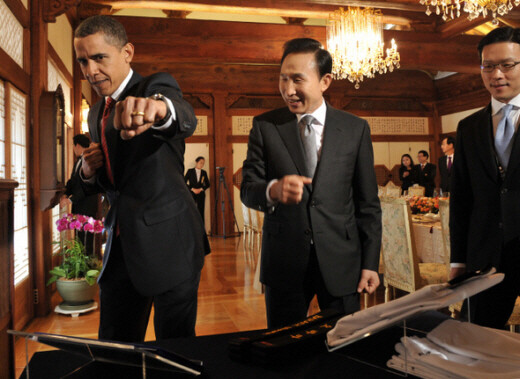hankyoreh
Links to other country sites 다른 나라 사이트 링크
U.S. calls for FTA renegotiations is an attempt to artificially adjust its market share

Analysts are saying the reason the U.S. is calling for renegotiations of the auto trade clauses of the South Korea-U.S. Free Trade Agreement (KORUS FTA) is due to the vast difference in the scale of auto exports between South Korea and the U.S. However, based on the far greater number of concessions made by South Korea to the U.S. in the agreement between the two countries already, some critics are charging that the U.S. calls for renegotiations are an attempt to artificially adjust its market share. Even the offices of the U.S. Trade Representative are calling it “managed trade,” rather than “free trade.”
Experts in South Korea are saying that no further concessions can be made because everything has already been given away. In the area of tariffs alone, South Korea has already agreed to immediately and completely abolish its 8 percent tariff on imported automobiles when the agreement takes effect, while the U.S. has agreed to incrementally abolish its 2.5 percent tariff on automobiles of 3000cc displacement over a period of three years. The high tariff of 25 percent for pickup trucks, which are mainly supplied by the so-called “Big Three” automakers, is to be lowered over a period of ten years. Additionally, measures to revise taxation by changing the displacement standard, to adjust exhaust regulations to conform to U.S. standards, and to defer application of safety standards on U.S. cars for two years were benefits given to U.S. automobiles, which have large displacement.
On top of this, a “snap back” provision for quick conflict resolution was introduced that would immediately return tariffs to their previous levels in the event of a violation of the agreement. As a result of these stipulations, the prevailing view among observers is that the agreement already reached was a humiliating bargain for South Korea and that there is nothing left to give.
For these reasons, some experts are predicting that even if it is calling for renegotiations, it will be difficult for the U.S. to make any specific demands. Kim Ki-chan, professor of business administration at the Catholic University of Korea, says, “The imbalance in exports is the result of a loss of competitiveness by the U.S. automotive industry, which focuses on large models, so the call for renegotiations can be interpreted as meaning, ‘We are going to raise our market share even if we have to force it.’”
Kim Pil-su, automotive engineering professor of Daelim University, says that the U.S. “has nothing clearly worth demanding.” Kim also points out, “About all the U.S. can ask for is that the period for abolishing the tariff be put off another one or two years, and that is not something that can resolve the imbalance in exports.” In other words, there is nothing left but measures that would artificially raise the South Korean market share of U.S. automobiles, and this inevitably goes against FTA principles.
As a result, President Lee Myung-bak’s remark Thursday that “we are positioned to discuss things again” has provoked concerns over whether he is giving the U.S. an occasion to call for renegotiations, which might lead to even more concessions in the automotive area than were made in the previous agreement. One expert said, “It can essentially be interpreted as saying that we will have new negotiations or additional discussions.” The expert added, “The wisest choice for our government would actually be to go on the offensive and demand renegotiation on toxic, unequal items and to adjust its speed while keeping an eye on discussions in the U.S. Congress.”
Please direct questions or comments to [englishhani@hani.co.kr]
Editorial・opinion
![[Column] Park Geun-hye déjà vu in Yoon Suk-yeol [Column] Park Geun-hye déjà vu in Yoon Suk-yeol](https://flexible.img.hani.co.kr/flexible/normal/500/300/imgdb/original/2024/0424/651713945113788.jpg) [Column] Park Geun-hye déjà vu in Yoon Suk-yeol
[Column] Park Geun-hye déjà vu in Yoon Suk-yeol![[Editorial] New weight of N. Korea’s nuclear threats makes dialogue all the more urgent [Editorial] New weight of N. Korea’s nuclear threats makes dialogue all the more urgent](https://flexible.img.hani.co.kr/flexible/normal/500/300/imgdb/original/2024/0424/7317139454662664.jpg) [Editorial] New weight of N. Korea’s nuclear threats makes dialogue all the more urgent
[Editorial] New weight of N. Korea’s nuclear threats makes dialogue all the more urgent- [Guest essay] The real reason Korea’s new right wants to dub Rhee a founding father
- [Column] ‘Choson’: Is it time we start referring to N. Korea in its own terms?
- [Editorial] Japan’s rewriting of history with Korea has gone too far
- [Column] The president’s questionable capacity for dialogue
- [Column] Are chaebol firms just pizza pies for families to divvy up as they please?
- [Column] Has Korea, too, crossed the Rubicon on China?
- [Correspondent’s column] In Japan’s alliance with US, echoes of its past alliances with UK
- [Editorial] Does Yoon think the Korean public is wrong?
Most viewed articles
- 1‘We must say no’: Seoul defense chief on Korean, USFK involvement in hypothetical Taiwan crisis
- 2N. Korean delegation’s trip to Iran shows how Pyongyang is leveraging ties with Moscow
- 3‘Weddingflation’ breaks the bank for Korean couples-to-be
- 4Korea sees more deaths than births for 52nd consecutive month in February
- 5[Column] Park Geun-hye déjà vu in Yoon Suk-yeol
- 6Will NewJeans end up collateral damage in internal feud at K-pop juggernaut Hybe?
- 7[Column] Has Korea, too, crossed the Rubicon on China?
- 8Amnesty notes ‘erosion’ of freedom of expression in Korea in annual human rights report
- 9Samsung barricades office as unionized workers strike for better conditions
- 10[Column] The clock is ticking for Korea’s first lady